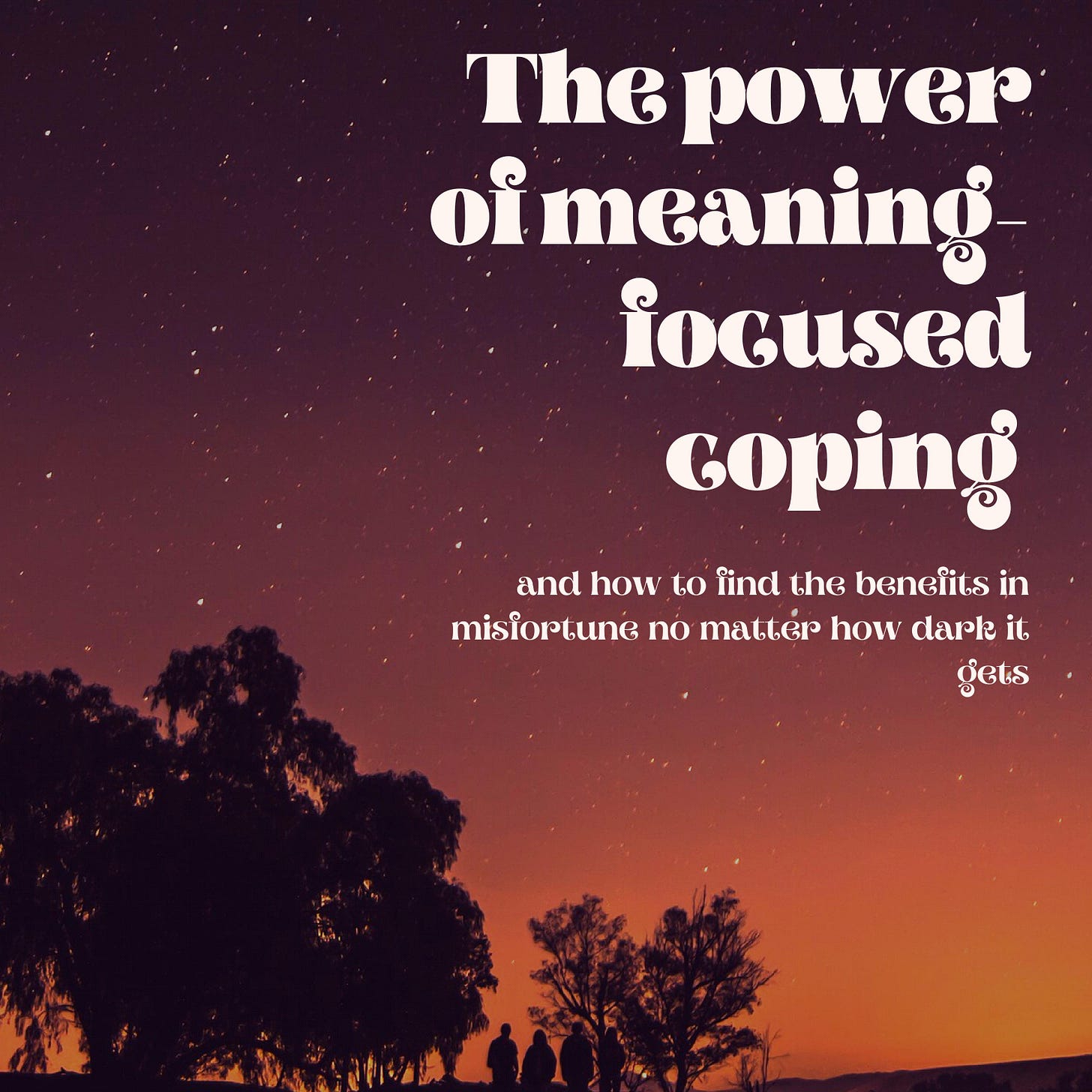The power of meaning-focused coping
It helps people find the benefits that arise from misfortune, no matter how dark it gets.
Dear Gen Dread Reader,
I’m sure you don’t need me to point out that things are especially heavy right now. Californian wildfires. Hurricane Laura. Bangladesh under water. The Greenlandic ice sheet melting beyond a point of no return. Pandemic mismanagement. The distrust of expertise threatening countless lives. The torrent of anti-Black racism. A dystopian US election cycle. The possibility that democracy will die in darkness. The unhappiest generation ever coming of age. It’s a hell of a lot to shoulder, and the load gets heavier each time a graspable solution is willingly ignored.
As I’ve been researching for my forthcoming book about the emotional impacts of the planetary health crisis, I’ve discovered a gamut of powerful strategies that can help us deal better with this weight. One that stands out as particularly relevant for the encroaching darkness we’re dealing with is a psychological strategy called meaning-focused coping. The psychiatrist Carl Jung said “meaning makes a great many things endurable, perhaps everything.” This strategy knows that to be true and puts it to work. When we find meaning in our experiences, no matter how grim, it gives us purpose, connects us with what matters, and has an improving effect on how we feel. That’s why meaning-focused coping can allow us to get through almost anything and persist with at least some degree of positivity. Meaning is the ultimate existential tool.
A psychologist named Susan Folkman described “meaning-focused coping” as a coping strategy for harmful situations that can’t be immediately solved and demand committed action for the long haul. It involves positively reappraising a tough predicament by drawing on one’s deepest personal beliefs, values, and existential goals. By realistically acknowledging a threat and then looking for its silver linings that align with one’s beliefs, values and goals, some optimism and purpose can almost always be found, even in the most terrible situations. In other words, this strategy is about connecting with the benefits that arise from misfortune.

For instance, once the COVID-19 pandemic set in, many people said that sheltering-in-place allowed them to get in touch with what really matters in life. It also gave them the time and resolve to strengthen their social relationships through what felt like endless Zoom meetings and phone calls. Meanwhile, many people learned to take stock of the little things that bring them joy around the house. Meaning-focused coping further involves reordering one’s priorities when adversity hits. For instance, a study that looked at meaning-focused coping responses from people who had received HIV+ diagnoses found that HIV+ mothers were able to cope better when they shifted priority from worrying about their illness to needing to care for their children. This strategy also does whatever it can to infuse ordinary events with positive meaning. Making food for someone as a way of expressing love, for instance, becomes even more important in dark times.
In the context of the climate crisis, the psychologist Maria Ojala has done great work looking at how meaning-focused coping connects to the ways we educate children about the environment. And this article beautifully describes how an Australian woman named Casey Kirchhoff used meaning-focused coping to deal with the grief of losing her 5 acre property in Australia’s last bout of record-breaking bushfires. In the wake of the blaze, Kirchhoff got the idea to start documenting any signs of life that were beginning to re-sprout. Practically, this meant taking pictures of a bud here and a root there. Then she created a digital platform for other people who’d also lost their homes to document life that was similarly regenerating on burnt out properties where their homes once stood. The platform has since become a way for people to connect with each other over their shared loss, as well as contribute research to scientists studying forest regeneration. It’s a way of containing one’s emotions with other people who can truly understand, while also doing good (for science and society). What’s not to love?
Kirchhoff says it's been really healing to see other people upload their observations and take care of their own patch of nature. The lesson being, there’s always something positive and nourishing to be found, even in the ashes.





Very helpful to understand the vocabulary valences here. And thanks specifically for the term "climate distress" which I'll fold into my efforts around climate coaching. Reading through several of your wonderful posts this afternoon, I'm grateful for the broad set of resources and lenses you are bringing to the topic.
I would offer that one of the core areas of resilience that we in the West tend to be cut off from is simply being in nature. See the work of folks like Animas Valley Institute, and John P. Milton. To get a sense of it, you can read three lovely entries in my friend and coaching colleague Hamish Mackay Lewis's Journal here: http://www.hamishmackaylewis.com/journal the 6-day solo, and then the Circle and the Bear parts I and II. Or you can hear Hamish's perspective here: https://www.youtube.com/watch?v=_vS2QwTOIuQ
Forgive me if this aspect of reselience is covered elsewhere in your blog, I'm still working my way through it!